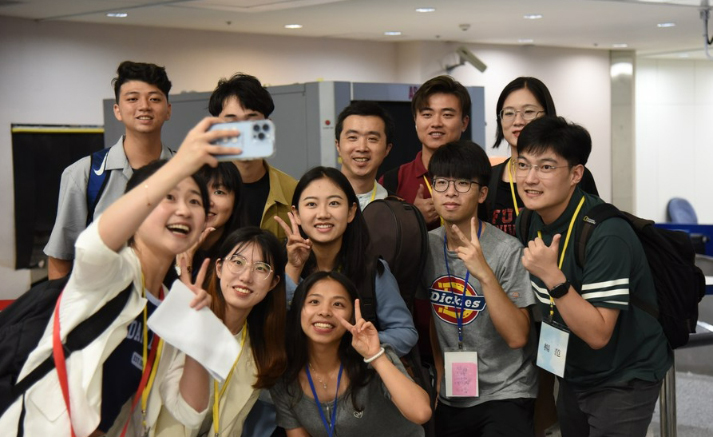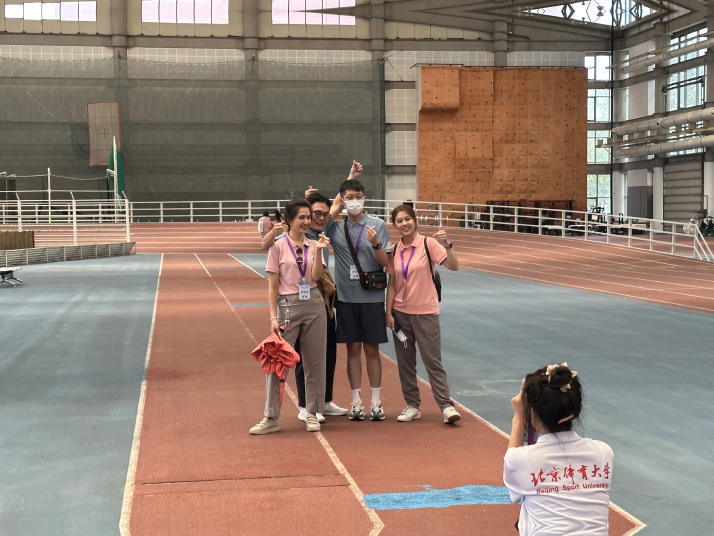| China |
| Youth exchanges strengthen connectivity across the Taiwan Straits | |
|
|
 Members of Chinese mainland’s first academic group to visit Taiwan in more than three years bid farewell to their peers from Taiwan at Taiwan Taoyuan International Airport on the afternoon of July 23 (XINHUA)
As the plane landed at Taiwan Taoyuan International Airport on July 15, Wen Yunhao, a fourth-year undergraduate majoring in history at Peking University, looked out the window at a view that was at once familiar and strange. It was the same airport that he had landed at seven years ago, when he and his family took a trip to the island. But this time, apart from the familiar rush of excitement, he was laden with anxieties—anxieties about the countless unknowns that awaited him. However, his worries quickly melted as he and his travel buddies walked out of the gate into a welter of flowers, waving hands, and friendly greetings. And this was the beginning of the first visit made by a delegation of mainland universities to the island in more than three years. A two-way street Wen was one of the 37 students and faculty members from five mainland universities who were invited by the Ma Ying-jeou Foundation, an organization founded by Taiwan's former leader Ma Ying-jeou, to visit the island from July 15 through July 23. Led by Hao Ping, Secretary of the Communist Party of China Committee of Peking University, the nine-day excursion to Taiwan came about three months after Ma made a private visit to the mainland in late March, the first such trip made by a sitting or former leader of Taiwan since 1949. In the course of 12 days, Ma led a group of youth from Taiwan on a tour through several universities and historical sites, where they learned about the country's tumultuous past in the first part of the 20th century. Taiwan has always been part of China's territory. By the time the People's Republic of China was founded in 1949, the defeated Kuomintang regime had retreated to the island, creating division between the two sides of the Taiwan Straits. China's Central Government has proposed the One Country, Two Systems principle, under which Taiwan will retain its own social and economic systems upon peaceful reunification. "People on both sides of the Taiwan Straits are all Chinese and we share the same ancestors," Ma said during this year's visit to Nanjing, Jiangsu Province. He further called on all Taiwanese youth to promote peace and revitalize the Chinese nation. As a follow-up to Ma's visit, the mainland university delegation's first exchange trip to Taiwan featured a selection of sites that all testify to the deeply entangled roots that connect Taiwan to the Chinese mainland. Places these students visited include the Palace Museum in Taipei, a museum in Tapei that houses nearly 700,000 Chinese art works that were formerly held at the former imperial palace in Beijing, a cycling culture museum founded by Giant Group, a Taiwan-based bicycle brand that is immensely popular among mainland consumers, and the Taiwan Semiconductor Manufacturing Co., the world's largest semiconductor manufacturer. "The itinerary was carefully designed to encompass campus tours, historical landmarks, and local hi-tech and traditional enterprises. This way, the students can look at Taiwan from many different angles," Li Gongqin, Vice President of Shih Hsin University in Taipei, told Shenzhen TV. Equally interesting were the little conversations that occurred on the sidelines of these official activities. During their visits to local universities, the students from the mainland bonded with their counterparts from Taiwan over their shared passions for movies, bands and TV dramas. At one point in the journey, what was originally a quiet bus ride quickly erupted into a carpool karaoke, in which youngsters from both sides joined in the singing of a stream of mandopop hits. "By tapping into our childhood and adolescent memories, youth culture provides a space for young people from both sides of the Straits to cultivate a natural fondness for each other and connect across societal barriers," Wen, the aforementioned student from Peking University, told Beijing Review. At the end of the journey, Wen left Taiwan with a drastically expanded Weixin (a popular super app) friend list, luggage loaded with souvenirs and gifts, and many jolly farewells at the departure gate. As the plane landed and he switched on his phone, it exploded with messages from his new acquaintances in Taiwan. Of course, there were many unfulfilled wishes, as nine days were too short for a thorough exploration of the island. "If I could revisit Taiwan, I'd like to travel to south Taiwan and then take a road trip all the way north along the Pacific coast," he said.  Participants in the 20th Youth Summer Camp visit the National Teams Training Center, an athletic training complex located in Beijing Sport University, on July 5 (PENG JIAWEI)
Old ties die hard Meanwhile, on the other side of the Straits, some 1,000 college students from over 40 universities in Taiwan are participating in the 20th Youth Summer Camp, an annual program organized by the All-China Federation of Taiwan Compatriots, a Beijing-based organization of compatriots from Taiwan who live on the mainland. Starting off with a four-day visit to Beijing, the camp was then divided into numerous branches that have spread over 28 provinces, autonomous regions and municipalities on the mainland, the Hong Kong and Macao special administrative regions and some overseas regions. Established in 2004, the Youth Summer Camp is one of the oldest official cross-Straits youth exchange events. Since then, more than 20,000 youth from Taiwan have participated in the program, visiting cities across the mainland and acquainting themselves with local cultures and traditions. As the first offline Youth Summer Camp in more than three years, this year's program came at the end of a hiatus of several years in cross-Straits youth exchanges due to political factors and the COVID-19 pandemic. The 2000s and the first half of the 2010s saw a cohort of forums, summer camps, student exchange activities, and long-term degree programs established to facilitate cross-Straits dialogue. In 2008, the year in which Ma took office, the mainland sent its first batch of exchange students to Taiwan. In 2011, mainland students were allowed to enroll in degree programs in the island for the first time. However, with the pandemic and the refusal of the current leader of Taiwan, Tsai Ing-wen, to recognize the one-China principle, cross-Straits youth exchanges have plummeted. Offline exchange activities have dwindled since 2016, the year in which Tsai came to power. In 2020, exchange programs sending mainland students to Taiwan were suspended as the epidemic broke out. According to Taiwan authorities, no students from the mainland will be pursuing degrees in Taiwan in the new academic year, which starts in August. In contrast, the mainland has always welcomed young people from Taiwan who wish to study at mainland universities. According to the Taiwan Affairs Office of the State Council, a few thousand youngsters from Taiwan enroll in mainland universities each year. At present, there are about 12,000 students from Taiwan studying on the mainland. Lin Weijie is one of the students from Taiwan who have chosen to pursue a degree on the mainland. In 2018, Lin became a doctoral candidate in modern Chinese history at the University of Chinese Academy of Social Sciences in Beijing. Fast forward five years and now he is a lecturer at Shanghai University and has decided to permanently settle on the mainland. "During my academic years here, I have made many friends and, most importantly, met my wife, who is from Jiaxing, Zhejiang Province. And now here I am, teaching a college course on the history of Taiwan, which has inspired many students to be genuinely interested in the island where I come from," Lin told Beijing Review. Lin's story is just one of many examples of how one brief sojourn on the mainland completely changes a Taiwanese youth's life trajectory. At a time of escalating tensions across the Taiwan Straits, when any friendly official gesture may be interpreted as politically charged, these tiny sparks of warmth and friendship offer a glimmer of hope that interpersonal connectivity among the younger generations can bridge the widening divide between the two sides of the Straits. (Print Edition Title: Bridging the Straits) Copyedited by G.P. Wilson Comments to pengjiawei@cicgamericas.com |
|
||||||||||||||||||||||||||||||
|